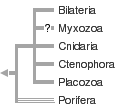Picture of the poster

The panels
Subject of this poster
and of the relative paper
Poster and article at http://david.olivier.name/mmam/
-> We owe ethical treatment to all sentient beings.
All suffering is bad, whatever the being that is suffering.
-> But present-day knowledge is unable
to give an account of sentience.
The mind-matter problem remains intractable.
-> We must take this problem more seriously if we are to further the cause of animals.
We must no longer allow animal sentience to be dismissed as unknowable, or reconstructed as painless signal-processing.
1. We, animal people, usually think
that mainstream scientific knowledge
is on our side:
“What prevents animal sentience from being fully recognized and taken into account is the influence of economical interests and of habits and prejudices inherited from the past... but modern science is on our side!
2. It is true, in a sense,
that science is on our side:
Do we need support for the idea of mental similarity between human and non-human animals?
This is easy to find in science!

-> Evolutionary theory
All animals descend from common ancestors.
-> Ethology
Intelligent behaviour, animal culture, signs of distress...
-> Neurobiology
Anatomical, biochemical and functional similarities.
3. But basically, present-day knowledge
can give no consistent and credible
account of sentience.
The problem is a serious one,
for it involves the foundations of the way
we account for reality:
-> In science: the problem with physics.
Present-day physics describes a mindless world...
or a worldless world.
-> In philosophy: the conception of mind.
Present-day philosophy of mind describes a mindless “mind”.
4. Why is physics specially important?
All real phenomena are ultimately physical phenomena.
=> Nothing that other sciences can assert
can be incompatible with the truths of physics.
5. What is the problem
with current physics?
-> Classical physics gives an account of reality
that is complete without reference to sentience.
=> Consciousness can be “saved” only by accepting that it has no effect on the world (epiphenomenalism).
-> Quantum physics undermines the very notion
of independent physical reality.
For the standard (“Copenhagen”) interpretation, there is no reality beyond the intersubjective (=> human) agreement on the outcome of experiments.
=> Questions about what really is -- and particularly, about whether or not a pig / fish / beetle / amoeba is sentient -- are dismissed as meaningless.
6. What is wrong with our philosophy of mind?
Functionalism is now the dominant doctrine
in philosophy of mind.
But functionalism amounts to neo-behaviourism: sentience (the way it feels to have mental states) is absent.
The functionalist “mind” has causal relations with physical events; but it is an empty mind. Functionalist “pain” isn't pain; it makes us scream but does not hurt.
Functionalist “pain” is thus of no ethical significance. We have no reason or obligation to relieve it.
Certain theories of Darwinian flavour also dismiss the reality of consciousness.
7. Serious consequences for the animals
The subjective point of view is precluded by construction from our fundamental realms of knowledge.
Modern science's inability to conceptualize sentience implies our inability to determine where sentience appears within the continuum from stones to humans.
Humans thus place the divide where they find it most convenient:

“ Regarding animals, we can talk of nociception -- it would be unscientific to speak of suffering... ”
8. What should we do about it?
The authority of science is a very powerful argument.
=> We must not allow that in the name of science the existence and relevance of animal sentience be denied.
For this it is not necessary to:
-> Adopt an anti-scientific position.
-> Wait for an alternative scientific perspective to be developed.
9. Imagine a declaration by scientists
and other scholars:
“ The way physics and philosophy deal with mind today is inadequate. sentience is an objective reality of the world, despite the inability of our current physics and philosophy of mind to account for it. The ethical implications of the objective existence of sentience, when and where it is present, are not to be dismissed in the name of science. ”
If influential thinkers were to take such a stand, wouldn't it change the situation fundamentally?
10. Such a declaration is possible!
It is possible because actually no one can believe an account of reality in which sentience is absent or without effect.
No one can believe:
-> That sentience doesn't exist or is an illusion.
-> That consciousness is without effect on the world.
-> That there is no reality beyond our own immediate experience.
Our inescapable belief in sentience and in a reality beyond our immediate mind results from our condition as sentient, deliberative beings.
Our arguments are detailed in the corresponding paper.
